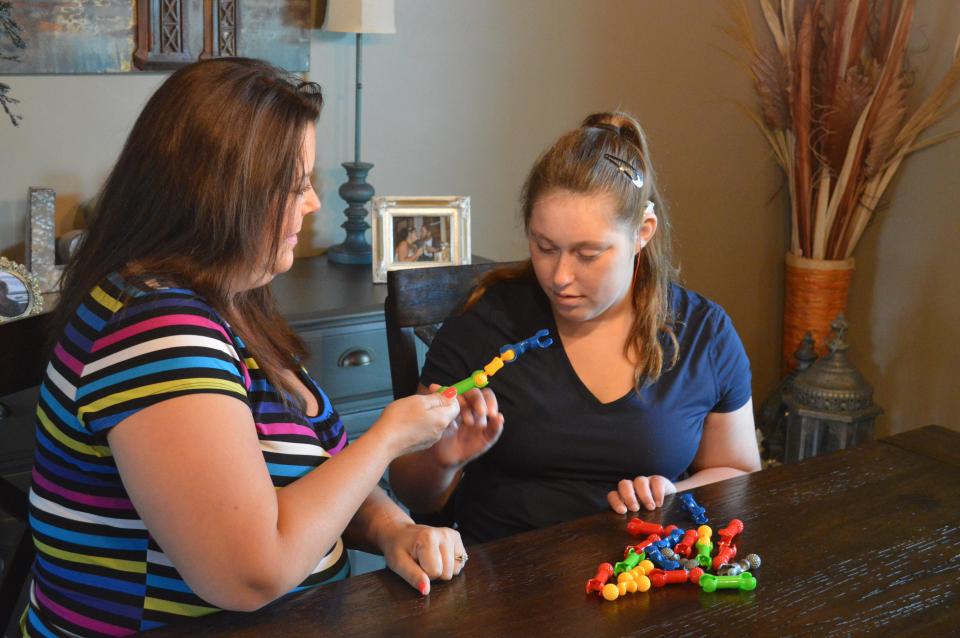'Not enough places for them to go,' Kismet closure highlights lack of disability, special needs services in Brown County

GREEN BAY – Kismet Advocacy LLC was the fourth special needs program Heather Schmid counted on to care for her autistic child in the last six years. On July 13, it was the fourth program to let her down.
When Kismet Advocacy closed that day after workers walked out, it left parents like Schmid scrambling to find a replacement for the in-home, center-based and school program services for children with "complicated mental health diagnoses, trauma, significant behaviors and autism" that Kismet advertised on its website. Amy Jo Timm, the owner of Kismet, said the company was actively serving 73 clients, roughly 40 from Brown County, when it shut down.
Schmid's daughter, Ainsley, an 18-year-old who was born deaf, is non-verbal autistic and has severe developmental disabilities, requires one-on-one care at any program she attends. However, Schmid has found there are few programs in Brown County able to provide those resources.
Kismet provided care services for Ainsley for nearly four years, and those services continued after she turned 18, despite aging out of the children’s disability services program in January.
Schmid had hoped to transition her daughter into adult services but was still relying on Kismet when it closed because she hadn't found a program that could provide the full-time, one-on-one care her daughter needs. Kismet's closing created new urgency in that search, but she still has not found a service that can meet her child's needs.
"I have been asking questions for years about what happens when she transitions out of the child services with the county and into adult services," Schmid said. "I was always reassured that adult services, there's so much out there, everything will be fine. You'll have your pick of where you want to send her. ... It has been a nightmare since January."
RELATED:Monkeypox cases have been confirmed in 10 Wisconsin counties, state health data shows

Kismet's closure, originally expected to last 30 days, was a result of the company staff dwindling from nearly 30 to five employees; several staff members said they resigned because they had not been paid.
Timm, who uses they/them pronouns, confirmed that they failed to pay their staff and said the failure was caused by the company wrongly submitting billing codes for provided services and not receiving owed funds as a result.
Timm estimated Kismet owes employees roughly $100,000 in pay, fees and incorrectly charged health insurance costs.
Social work license revoked over 'ethical violations'
They said one of the reasons Kismet can't reopen immediately is because Timm's social work license was revoked due to "ethical violations." Timm did not specify what those violations were but said they hope to reopen in December when the license is restored.
In some instances, former Kismet staff have continued to independently provide services for parents like Schmid who have struggled to find a new placement for children with complicated needs, but it is only a temporary solution.
A former Kismet employee has been caring for Ainsley while Schmid is at work. That care is funded by Medicaid, but the care provider is looking for other full-time work and has only agreed to work through the summer.
“I don't know where my child is going to go at the end of August,” Schmid said. “My entire life is up in the air right now, and it's very unsettling.”
Timm said Kismet was one of the few providers in Brown County that offered care for children who needed one-on-one or even two-on-one care and provided schooling options regardless of the severity of a child's behaviors.
"Within this community, there are not very many providers who provided the level of care we did," Timm said.
Timm estimated 10 clients "probably have nowhere right now just because of the level of their behaviors."
Brown County Public Health did not respond to a request for information about how many former Kismet clients lost care.
In an email to the Press-Gazette, the department said the county "seeks to maintain a network of quality service providers for the families we serve, and keeps in regular contact with providers. When circumstances change, the Health and Human Services Department works with families to adjust plans and connect with providers who can meet their needs."

Challenged to find appropriate care
Finding care has been a struggle for Schmid for most of Ainsley’s life. Ainsley attended three different programs from sixth grade until she started at Kismet.
She began at Syble Hopp School in De Pere in sixth grade, a public school with funding from Brown County that serves children with disabilities from age 3 until 21. But after two years, the school told her it could not handle Ainsley's behaviors, which included biting and scratching herself.
Another program inadvertently allowed her to wander off before deciding that it, too, could not meet her needs.
She left yet another program in an ambulance after her head was slammed into a gym floor by another child.
By the time Ainsley started at Kismet at age 15, Schmid was desperate to find a safe option for her child.
Ainsley received one-on-one care from Kismet, as required by the county, from 7:30 a.m. until 5:30 p.m. on weekdays, including during the summer.
Her care included her schooling, which focused on self-care tasks to help Ainsley become more self-sufficient. Schmid estimates that Ainsley has the mental capacity of a 2-year-old. Normal schooling wouldn't benefit her, she said.
When Ainsley turned 18, her caseworker from the county’s Children's Long-Term Support program could no longer work with the family, and her case was taken over by another county department, the Aging & Disability Resource Center of Brown County.
ADRC works with two managed-care programs that find government-financed services for adults with disabilities, Lakeland Care Inc. and Inclusa. Those agencies are expected to work with families to create care plans, manage funding and connect them with providers.
Inclusa, the agency that Schmid works with, has been unable to find an adult-care program for Ainsley, Schmid said.
Schmid said she’s learned that the programs in the area either lack vacancies or don’t have the resources to provide the care Ainsley needs.
She said Inclusa has recommended a family member care for Ainsley.
"We all work full time," Schmid said. "What are you supposed to do? Lose your house, lose your cars, lose your way of life?"
'It's really hard to find resources'
In addition to working with Inclusa, Schmid is also working closely with the West De Pere School District as Ainsley is expected to attend school until age 21. Amy Schuh, director of student services for the district, said a handful of their students were displaced by Kismet's closure, including Ainsley, forcing the district to scramble for new programs.
Schuh said it's difficult to find off-site placements for students with significant needs during the school year.
"We relied on Kismet to provide individual support to our students who had significant needs," Schuh said. "It's really hard to find resources. A lot of off-site placements have waiting lists."
She added that as a result, they've been forced to consider programs they haven't used before or "start from scratch and build something that meets the needs of our students."
Schuh said she is currently working with a provider to create a program for the students in her district who were displaced by Kismet. She's hopeful that they'll be able to provide services to those students, including Ainsley, this school year.
Mary Schlautman, an information and assistance coordinator for ADRC, referred questions about the availability of care for adults with disabilities to Inclusa and Lakeland Care.
Lakeland CEO Sara Muhlbauer was not immediately able to provide the number of providers available in the county or say if there are adequate resources in the county for adults with disabilities. Inclusa did not respond to requests for information.
Schlautman said roughly 50 families a year transition from the Children's Long-Term Support program to ADRC when their children turn 18.
The ADRC then connects these families with the proper channels to find care. Schlautman said 70% of these families require managed care programs or programs that will assist with daily living.
Another mother of a non-verbal autistic teen, who asked to remain anonymous to protect the identity of her child, has also been concerned about finding a safe program for her child.
Her son is non-verbal autistic and received one-on-one care at Kismet for at least three years. Like Ainsley, her son is now receiving care from a former Kismet employee while she looks into other resources.
Like Schmid, she has been told finding adult services in Brown County is easier than finding services for children.
"I'm not sending my child back to Kismet," she said about the program reopening.
Kismet services declined over time
She said Kismet's services declined over months with the amount of time her son spent at the program shortened. Her son went from receiving between 20 and 25 hours of care per week to just eight hours per week.
As hours were cut back she was able to advocate with her county caseworker for her son to receive 15 hours of care weekly, but she said her son rarely spent the full time at Kismet and several sessions were canceled.
She also noticed employee turnover with her contacts at Kismet, from who went over scheduling to the adults working with her kid, changing frequently.
"There was just weird stuff like that going on," she said. "But my kid was still safe and coming home safe and everything and so I just tried not to think about it too much."
Both mothers said they are grateful for the support and resources they have received from Brown County from funding for programs to caseworkers who helped them advocate for care for their children.
The problem, they said, is that there aren't enough providers to give care to people who have disabilities like their children.
"There are just so very little resources available to families of special needs children," Schmid said. "Especially in this area, there's not enough programs. There's not enough places for them to go."
Alexandria Bursiek Kloehn is a business reporter for the Green Bay Press-Gazette. You can reach her at abursiekkloehn@gannett.com or view her Twitter profile at @bursiekkloehn.
This article originally appeared on Green Bay Press-Gazette: Green Bay Kismet closure highlights need for disability services

